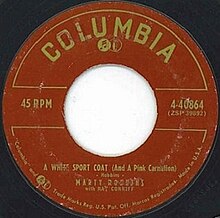This article needs additional citations for
verification. (August 2009) |
| "A White Sport Coat (And A Pink Carnation)" | ||||
|---|---|---|---|---|
 | ||||
| Single by Marty Robbins | ||||
| from the album Marty's Greatest Hits | ||||
| B-side | "Grown-Up Tears" | |||
| Released | March 1957 | |||
| Recorded | January 25, 1957 | |||
| Genre | Country | |||
| Length | 2:31 | |||
| Label | Columbia 40864 | |||
| Songwriter(s) | Marty Robbins | |||
| Producer(s) | Mitch Miller | |||
| Marty Robbins singles chronology | ||||
| ||||
"A White Sport Coat (And A Pink Carnation)" is a 1957 country and western song with words and music both written by Marty Robbins. It was recorded on January 25, 1957, and released on the Columbia Records label, over a month later, on March 4. [1] The arranger and recording session conductor was Ray Conniff, an in-house conductor/arranger at Columbia. Robbins had demanded to have Conniff oversee the recording after his earlier hit, " Singing the Blues", had been quickly eclipsed on the charts by Guy Mitchell's cover version, which was scored and conducted by Conniff in October 1956.
The song reached no. 1 on the US country chart, becoming Marty Robbins' third No. 1 record. [2] It reached no. 2 on the Billboard pop chart, [3] and no. 1 in the Australian music charts. Billboard ranked it as the No. 17 song for 1957. [4]
Background
Robbins recalled writing "A White Sport Coat" in approximately twenty minutes, while being transported in a standard automobile. [5] He is said to have had the inspiration for the song while driving from a motel to a venue in Ohio, where he was due to perform that evening. During the course of the journey, he passed a local high school, where its students were dressed ready for their prom.[ citation needed]
In the song, the narrator was hoping to go to prom with a certain girl to dance, wearing a white sport coat and a pink carnation. However, the girl decided to go to the prom with another guy, resulting in the narrator being in a blue mood.
Cover versions
- A version by Johnny Desmond received some play also, peaking at No. 62 on the U.S. pop charts.
- In UK the song was a notable hit for the English rock and roll singer Terry Dene, which reached #18 in the UK Charts. A recording by The King Brothers peaked at #6. Both of these versions hit in early summer 1957.
In popular culture
- The song is mentioned in Don McLean's song " American Pie" (1971), with just the lyric about the "Pink Carnation".
- Jimmy Buffett's 1973 album A White Sport Coat and a Pink Crustacean spoofs the title of the song.
- The song is featured in the opening credits of the 1997 film Going All the Way.
- The song can be heard during the bowling-alley scene in Martin Scorsese's 2019 film The Irishman.
- Paul McCartney famously dressed in a white sport coat in homage to the song on July 6, 1957, the day of the Woolton Village Fete when he was introduced to John Lennon.
References
- ^ Thoenicke, Manfred. The Ray Conniff Recordings: The Columbia Years, Part 1: The Backings and New York* Recordings. p. 18.
- ^ Whitburn, Joel (2004). The Billboard Book Of Top 40 Country Hits: 1944-2006, Second edition. Record Research. p. 293.
- ^ Whitburn, Joel (2004). The Billboard Book of Top 40 Hits, 8th Edition (Billboard Publications), page 532.
- ^ Billboard year-end top 50 singles of 1957
- ^ Marty Robbins interviewed on the Pop Chronicles (1969)
External links